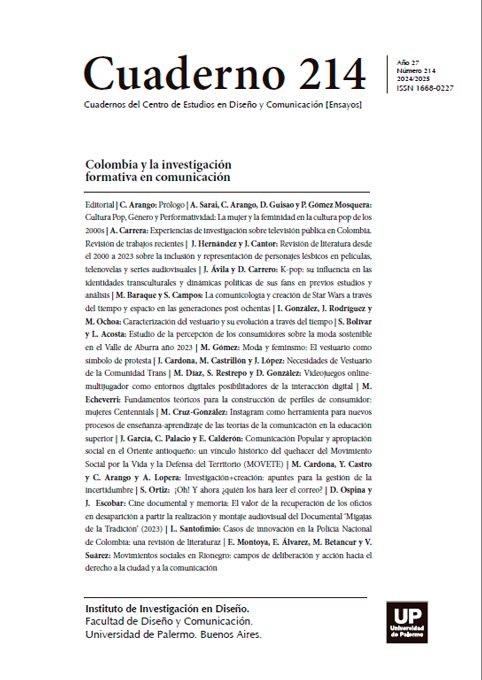K-pop: su influencia en las identidades transculturales y dinámicas políticas de sus fans en previos estudios y análisis
Resumen
El K-Pop es un género musical originario de Corea del Sur, que, sin importar las aparentes barreras idiomáticas y culturales, se ha abierto paso en un mundo transcultural.
Citas
Han, B. (2017). K-Pop in Latin America: Transcultural Fandom and Digital Mediation. International Journal of Communication. https://ijoc.org/index.php/ijoc/article/view/6304/2048
Howard, K. (2014). [Review of The Korean Wave: Korean Media Go Global, by Y. KIM]. Bulletin of the School of Oriental and African Studies, University of London, 77(3), 644–646. http://www.jstor.org/stable/24692410
Jaivin, L. (2017). CULTURE: IN AND OUT OF CONTROL. In L. Jaivin, J. Golley, & L. Tomba (Eds.), Control, pp.149–166. http://www.jstor.org/stable/j.ctt1sq5tvf.17
Kim, D. (2012). Reappropriating Desires in Neoliberal Societies through KPop. UCLA. ProQuest. https://escholarship.org/uc/item/6p04h9tf
Kim, D. Y. (2015). The Birth of Korean Cool [Review of The Birth of Korean Cool: How One Nation Is Conquering the World Through Pop Culture, by E. Hong]. Sociological Forum, 30(4), 1125–1129. http://www.jstor.org/stable/24878719
Kim, J. (2011). Korean wave in China. It’s impact on the South Korean-Chinese relations. (Master’s thesis, University of British Columbia, Canada). https://circle.ubc.ca/handle/2429/39363
Lam, C., & Raphael, J. (Eds.). (2019). Aussie Fans: Uniquely Placed in Global Popular Culture. University of Iowa Press. https://doi.org/10.2307/j.ctvq4c15d
Lee, S.-H., Choi, S. and Kim, H.-W. (2021), “Unveiling the success factors of BTS: a mixedmethods approach”, Internet Research, 31(5), 1518-1540. https://doi.org/10.1108/INTR12-2019-0507
Maase, K., & Larsen, M. (2017). Popular Culture, ‘Resistance,’ ‘Cultural Radicalism,’ and ‘Self-Formation’: Comments on the Development of a Theory. In M. Butler, P. Mecheril, & L. Brenningmeyer (Eds.), Resistance: Subjects, Representations, Contexts (pp. 45–70). Transcript Verlag. http://www.jstor.org/stable/j.ctv1xxrtf.6
Maliangkay, R. (2019). [Review of The Korean Wave: Evolution, Fandom, and Transnationality, by T.-J. Yoon & D. Y. Jin]. Korean Studies, 43, 201–203. https://www.jstor.org/stable/27098703
Pooch, M. U. (2016). Cultural Diversity in a Globalizing Age. In DiverCity – Global Cities as a Literary Phenomenon: Toronto, New York, and Los Angeles in a Globalizing Age (pp. 37–56). Transcript Verlag. http://www.jstor.org/stable/j.ctv1wxt87.7
Messerlin, P. A., & Shin, W. (2017). The Success of K-Pop: Haw Big and Why So Fast? Asian Journal of Social Science, 45(4/5), 409–439. http://www.jstor.org/stable/44508094
Parc, J. (2018). [Review of THE KOREAN WAVE: Evolution, Fandom, and Transnationality, by T.-J. Yoon & D. Y. Jin]. Pacific Affairs, 91(4), 810–812. http://www.jstor.org/stable/44874907
Park, K. (2008). The growth of cultural industry and the role of government. Case of Korea. (Master’s thesis) Retrieved from http://dspace.mit.edu/handle/1721.1/45761
Pooch, M. U. (2016). Cultural Diversity in a Globalizing Age. In DiverCity – Global Cities as a Literary Phenomenon: Toronto, New York, and Los Angeles in a Globalizing Age (pp. 37–56). Transcript Verlag. http://www.jstor.org/stable/j.ctv1wxt87.7
Shin, H. (2009). Reconsidering Transnational Cultural Flows of Popular Music in East Asia: Transbordering Musicians in Japan and Korea Searching for “Asia.”, Korean Studies, (33), 101–123. http://www.jstor.org/stable/23719262
Tan, M. (2015). K-Contagion: Sound, Speed, and Space in “Gangnam Style.” TDR (1988), 59(1), 83–96. http://www.jstor.org/stable/24585057
Thomas, E., Beattie, T., & Zhang, A. (2020). #WhatsHappeningInThailand: the power dynamics of Thailand’s digital activism. Australian Strategic Policy Institute. PP. 1-23. http://www.jstor.org/stable/resrep27718
Trazo, C. (2020). Understanding K-Pop: How the Spread of Korean Pop Music in the Digital Age Has Impacted Fandom. Writing for a Real World 2019-2020: A Multidisciplinary Anthology by USF Students. https://jstor.org/stable/community.31072893
Los autores/as que publiquen en esta revista ceden los derechos de autor y de publicación a "Cuadernos del Centro de Estudios de Diseño y Comunicación", Aceptando el registro de su trabajo bajo una licencia de atribución de Creative Commons, que permite a terceros utilizar lo publicado siempre que de el crédito pertinente a los autores y a esta revista.


